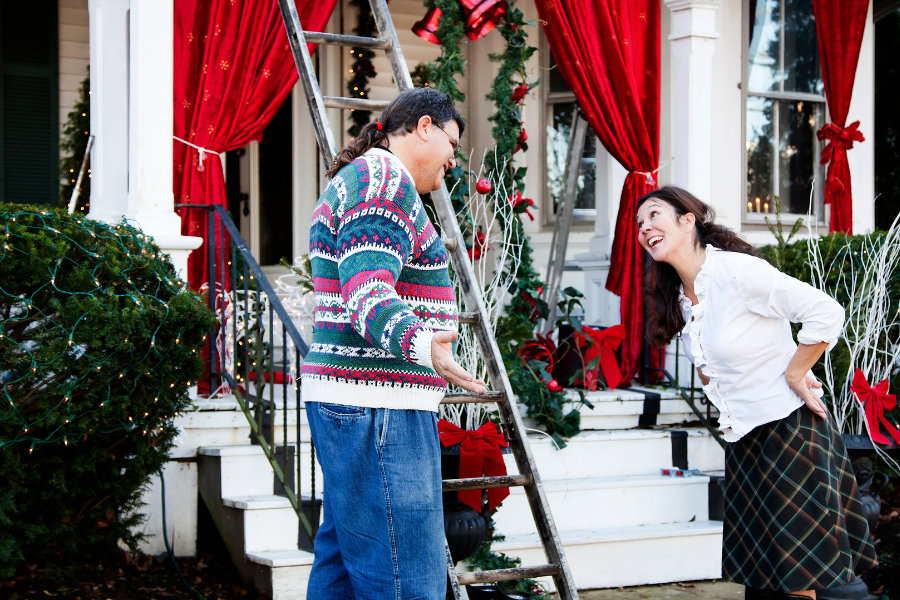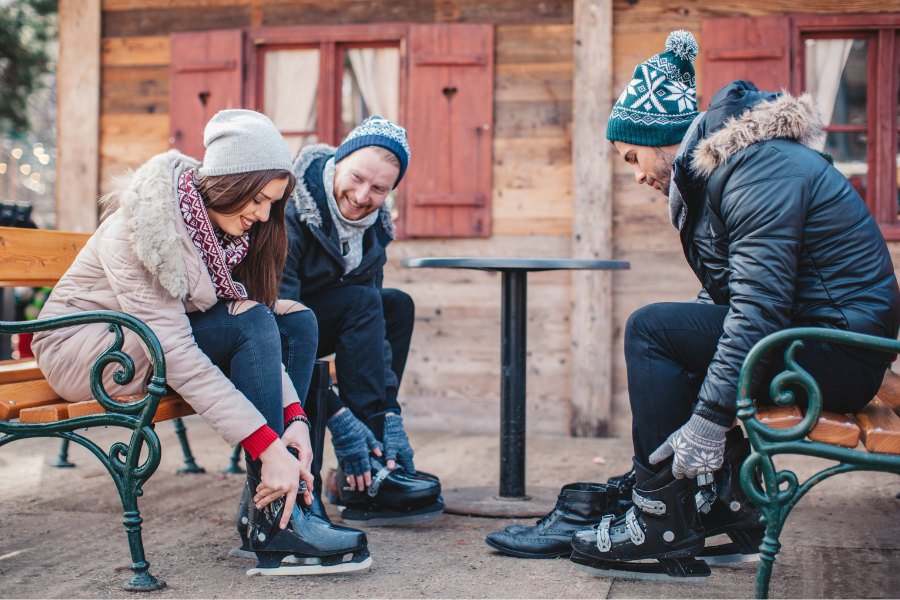As the holiday season approaches, it’s common to feel a surge of enthusiasm, anticipation, and excitement in the air. Glistening streets and adorned houses illuminate with the vibrant colors of Christmas. Stores dazzle with the wonders of the season, captivating shoppers. Amidst family gatherings, parties, and an abundance of festive delights, we’re encouraged to indulge and revel in the merriment. However, it’s important to acknowledge that the holidays can also evoke stress, sadness, and fatigue. If you’re feeling blue or find yourself losing that sense of joy, consider these tips on finding and maintaining balance and happiness during this special time.
Define what the holidays mean to you.
There is no such thing as an “ideal” or picture-perfect holiday season. Going into the season, take time to evaluate what the holidays mean to you and what you can realistically accomplish.
(1) Redesign your expectations to focus away “what you have to do” to “what you can and want to do.”
(2) Embrace what you consider to be the true spirit of the holiday season and make it your priority.
Identify potential sources of stress.

What causes you stress during the holiday season? Do you drive yourself ragged trying to do too much? Do certain family dynamics or family members cause you apprehension? Do you find yourself spending too much money or overindulging in eating and drinking alcohol? Are you struggling with the loss of a loved one or the feeling of being isolated and alone?
(1) Create a list of those issues that cause you the most stress and start mapping out some possible solutions.
What can you do to create and stay within your “holiday” budget? How can you change a “stressful” holiday routine into something less taxing and more enjoyable? In what way can you take “time out” from dealing with difficult family situations or people? How can you stay within a healthy regiment throughout the holiday season?
(2) Talk to friends and family members about new ways to tackle the holiday stress.
Think about solutions such as: a) skipping gifts and donating money to charity; b) making gifts instead of buying them; c) shopping online for the best deals; d) going to a restaurant for your holiday meal; e) doing something unique like traveling or visiting special friends and family over the holidays; or f) factoring in fun ways to exercise even if it is something as simple as walking around the mall to enjoy the holiday decorations.
Establish your holiday expectations and boundaries.
Once you define your holiday values and sources of stress, commit to personal boundaries that will allow you to gain or maintain your holiday spirit.
- Set clear and decisive limits throughout the holiday season so key friends and family members will understand. Communicate your holiday boundaries to these individuals and be willing to do whatever it takes to enforce them.
- Learn to say no and understand that you don’t always need to explain your rationale to others. For the sake of your health and well-being, you can always call “time out” as a viable way to avoid or walk away from an impossible situation or person.
- Understand what you can and cannot control over the holidays and adjust your behavior and attitude accordingly.
- Have faith in yourself. Ultimately, you know what is best for you. And, while you may have to somewhat compromise throughout this process, keep your core boundaries intact.
Maintain good health habits throughout the season.
The holiday season can be a time to overindulge in how we spend, what we do, and how we eat and drink. While your overindulgences may go on for only a month or so out of the year, what you do now can have lasting effects on your health and well-being in the future. Especially during stressful times like the holidays, self-care is essential.
1. Exercise regularly:

Incorporate some form of physical activity into your daily routine. Even a short walk or running errands can have a positive impact.
2. Stick to your schedule:
Try to maintain your usual routine during the holidays to prevent overeating, lack of sleep, or forgetting important tasks such as taking medication or paying bills. (For tips on how to cultivate your rhythm in life, CLICK HERE.)
3. Prioritize sleep:
Adequate sleep is crucial for both your mental and physical well-being. Aim for 7-8 hours of sleep each night and avoid staying up late or pulling all-nighters. (For insights on how to solve your sleep struggle, CLICK HERE.)
4. Maintain a balanced diet:
While holiday festivities offer tempting treats, it’s important to eat sensibly. Enjoy the celebrations responsibly and ensure you prioritize your health.
5. Moderate alcohol consumption and avoid substance abuse:
The holiday season often encourages excessive partying, but it’s crucial to prioritize your health and well-being by avoiding excessive alcohol consumption or substance abuse.
6. Take time for yourself:

Amid the holiday chaos, carve out moments of solitude to recharge and reflect. Consider it a mental mini-vacation. (To learn more about how to reduce stress by finding your good place, CLICK HERE.)
Remember to spread kindness and goodwill by reaching out to others.
Embracing the spirit of the holiday season involves considering ways to assist those less fortunate than ourselves. This can include donating food, clothing, or money to charity, volunteering at soup kitchens or senior facilities, or supporting toy drives. By reaching out to support others in need, we not only provide invaluable benefits to the individuals we serve but also contribute to the betterment of our community. Engaging in these acts of kindness can bring a sense of accomplishment and purpose, ultimately enhancing the joy we experience during this holiday season.
Given the stress, strains and emotions inherent to the holiday season, be good to yourself. This is not an easy time of the year for many people, so unlock your holiday spirit and share it with others.
Written by: Patricia K. Flanigan, Smart Strategies for Successful Living
 Patricia K. Flanigan is a vibrant and passionate advocate for quality living and aging. She has dedicated over 28 years to working in higher education, but now enjoys a more peaceful lifestyle as the founding director and writer of Smart Strategies for Successful Living. In her free-time, she cherishes spending quality time with her family and friends, as well as getting out into nature with her beloved Samoyed dog, Wylie. Patricia loves helping others age gracefully and shares her wisdom through her content to promote the ultimate success in living.
Patricia K. Flanigan is a vibrant and passionate advocate for quality living and aging. She has dedicated over 28 years to working in higher education, but now enjoys a more peaceful lifestyle as the founding director and writer of Smart Strategies for Successful Living. In her free-time, she cherishes spending quality time with her family and friends, as well as getting out into nature with her beloved Samoyed dog, Wylie. Patricia loves helping others age gracefully and shares her wisdom through her content to promote the ultimate success in living.
For your link to Smart Strategies for Successful Living, CLICK HERE.
Check Out Our Captivating Videos
![]() About Smart Strategies for Successful Living: CLICK HERE.
About Smart Strategies for Successful Living: CLICK HERE.
![]() Our YouTube Channel: CLICK HERE.
Our YouTube Channel: CLICK HERE.
Related Videos Worth Watching:
![]() Cultivating Your Rhythm in Life for Balance and Harmony: CLICK HERE.
Cultivating Your Rhythm in Life for Balance and Harmony: CLICK HERE.
![]() The Incredible Ways Dogs Promote Our Health and Happiness: CLICK HERE.
The Incredible Ways Dogs Promote Our Health and Happiness: CLICK HERE.
![]() Cultivate Your Success: Master the Art of Confidence: CLICK HERE.
Cultivate Your Success: Master the Art of Confidence: CLICK HERE.
![]() How to Craft a Life Worth Living: CLICK HERE.
How to Craft a Life Worth Living: CLICK HERE.
![]() Be Inspiring to Others: CLICK HERE.
Be Inspiring to Others: CLICK HERE.
Related Resources
7 Natural Ways to Deal with Holiday Stress: CLICK HERE
Source: Doctors Health Press
Stress, Depression, and the Holidays: Tips for Coping: CLICK HERE.
Source: Smart Strategies for Successful Living
10 Tips for Surviving the Holidays: CLICK HERE
Source: Psychology Today








